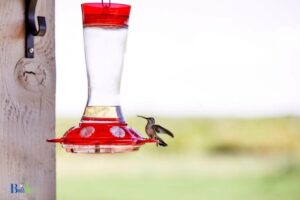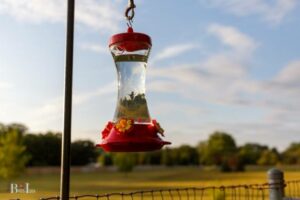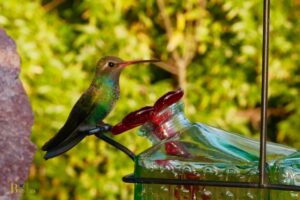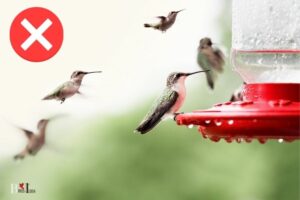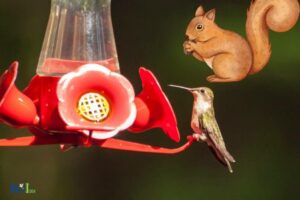How to Feed Baby Hummingbirds: Step By Step!
To feed baby hummingbirds, you’ll need to create a suitable nectar mixture, use a suitable feeding instrument, and follow a consistent feeding schedule.
Baby hummingbirds, also known as nestlings or fledglings, require a specific diet and feeding method to ensure their proper growth and development. Feeding baby hummingbirds is a delicate task that demands attention to detail, cleanliness, and suitable nourishment.
Feeding baby hummingbirds requires patience and careful attention to ensure their well-being. Make sure to monitor their growth and adjust the feeding schedule accordingly.
If the baby hummingbirds are orphaned or injured, it’s crucial to contact a licensed wildlife rehabilitator for proper care and guidance. Remember that feeding and raising baby hummingbirds is a complex task, and professional assistance can
6 Detailed Instructions on Feeding Baby Hummingbirds
| Stage of Growth | Food Type | Feeding Frequency | Feeding Tips |
| Day 1-2 | Sugar water (4:1 water to sugar ratio) | Every 15-20 minutes | Use a syringe or dropper and feed just enough to fill the crop (chest area). |
| Day 3-4 | Sugar water + dissolved protein powder (small amounts) | Every 20-30 minutes | Gradually introduce protein. Keep a consistent feeding schedule. |
| Day 5-7 | Sugar water + protein powder + insect powder | Every 30-45 minutes | Increase protein and insect powder. Make sure food consistency is not too thick. |
| Week 2 | Sugar water + small insects (fruit flies, aphids) | Every 45-60 minutes | Introduce live insects. Ensure cleanliness and fresh food. |
| Week 3 | Sugar water + larger insects (small ants, gnats) | Every 60-90 minutes | Encourage self-feeding by placing insects on a feeding dish. |
| Week 4 | Nectar from flowers | As needed | Allow baby hummingbirds to explore natural flowers. Keep feeding sugar water and insects as supplemental. |
Key Takeaway
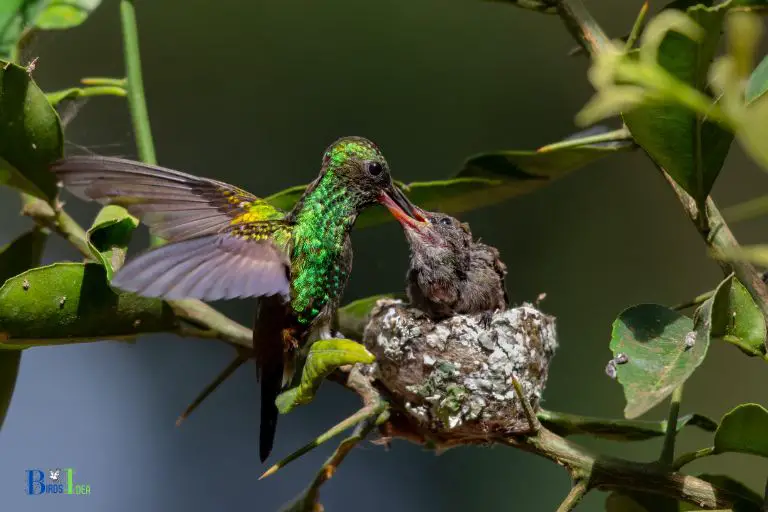
Five Facts About: Feeding Baby Hummingbirds
Understanding Baby Hummingbirds: The Basics
When it comes to caring for baby hummingbirds, understanding their biology, anatomy, nutritional needs, and feeding habits are of utmost importance. In this section, we’ll discuss the key aspects of baby hummingbirds and why proper nutrition plays a vital role in their growth and development.
Biology Of Baby Hummingbirds And Their Nutritional Needs
Hummingbirds are the smallest birds globally, and their babies are even tinier, weighing just a few grams. These featherless, blind, and helpless creatures require constant attention and care from their mothers.
To grow healthy and strong, baby hummingbirds need a diet rich in protein and fats, which is obtained from their mother’s milk. Their nutritional requirements are different from adult hummingbirds, as they have a higher metabolism rate and faster growth rate.
Anatomy Of Baby Hummingbirds: What Makes Them Different From Adults
Baby hummingbirds have a distinctive anatomy that sets them apart from their adult counterparts. They have a shorter bill and tongue, bigger heads, and shorter wings.
Their inability to fend for themselves makes them extra vulnerable, and they rely solely on their mother’s care for everything, including maintaining their body temperature.
Significance Of Proper Nutrition For Baby Hummingbirds’ Growth And Development
Proper nutrition guarantees the normal growth and development of baby hummingbirds. Lack of proper nutrition can lead to stunted growth, weakened immune systems, or even death.
Therefore, it’s crucial to understand their nutritional needs and feed them a balanced diet that meets their requirements. Mother hummingbirds feed their young ones multiple times, sometimes even up to 30-40 times per hour!
Factors That Affect Baby Hummingbirds’ Feeding Habits
Several factors influence the feeding habits of baby hummingbirds.
These include:
- Temperature: Baby hummingbirds cannot regulate their body temperature like adults. Hence, they require warmer temperatures to digest food properly.
- Competition: If there are multiple babies, competition for getting the mother’s attention and feeding can be intense.
- Weather: Weather can affect the frequency and duration of feedings. Harsh climatic conditions may decrease food availability, and this can affect the baby hummingbird’s health.
Understanding the biology, anatomy, nutritional needs, and feeding habits of baby hummingbirds are crucial for their healthy growth and development. Providing them with an adequate diet at the right intervals and monitoring their feeding habits is vital for their overall wellbeing.
Preparing For Feeding Baby Hummingbirds
Feeding baby hummingbirds may seem like a daunting task, but it can be a rewarding and fulfilling experience. Preparing for feeding baby hummingbirds is crucial, and there are a few essential things that you need to consider before feeding them.
In this section, we will be discussing the tools and materials required, setting up a safe feeding environment, choosing the proper food for baby hummingbirds, and mixing and preparing the food.
Tools And Materials Needed For Feeding Baby Hummingbirds
To feed baby hummingbirds, you’ll need to obtain the following:
- Feeder with small ports: A feeder with tiny ports enables you to control the amount of food intake by baby hummingbirds.
- Syringe: A syringe helps in measuring the food and feeding it to the baby hummingbirds.
- Warm water: You’ll require warm water to mix the food and also clean the feeder.
- Hummingbird food: Hummingbirds prefer a homemade mixture of sugar water consisting of four parts water and one-part sugar.
- Nest: If you decide to take care of abandoned hummingbirds, they’ll need the nest to feel safe and comfortable.
Setting Up A Safe And Comfortable Feeding Environment
After getting all the necessary tools and materials, it is essential to provide a safe and comfortable feeding environment for the baby hummingbirds.
Here are ways on how to set up a proper environment:
- Choose a safe location: Choose a location away from predators, direct sunlight, and windy areas to avoid any danger or discomfort to the baby hummingbirds.
- Isolated and unobtrusive location: Keep the baby hummingbirds in a place that is quiet, and where they can feel safe and secure. It helps to provide a warm, dark environment for them.
Choosing The Right Food For Baby Hummingbirds
Feeding baby hummingbirds with the correct food is necessary for their growth and development. They are tiny creatures that require a diet rich in energy and nutrients.
Here are some crucial points to consider when choosing their food:
- Sugar content: Choose a sugar mixture with four parts water and one-part sugar for their diet.
- Avoid food colorings or additives: They can disrupt the baby hummingbirds’ digestive system.
- Nectar type food: Baby hummingbirds prefer nectar type food that can be easily and efficiently digested in their bodies
Mixing And Preparing Food For Baby Hummingbirds
Mixing and preparing food for baby hummingbirds is vital to meet their nutrition requirements.
Here are the steps to follow:
- Boil the water and let it cool down.
- Add sugar in the water and stir it until it gets dissolved.
- The nectar should be ready to feed the baby hummingbirds. Store the mixture in the fridge.
- The feeder should always be cleaned before refilling with fresh nectar to avoid contamination.
Feeding baby hummingbirds requires patience, effort, and commitment to ensure their proper growth and development. With the right tools and materials, a safe and comfortable environment, the proper food choice, and a well-prepared mixture, feeding baby hummingbirds can be an exciting and enjoyable experience.
Feeding Methods For Baby Hummingbirds
Hummingbirds are delightful creatures to watch, and if you are lucky enough to find a baby hummingbird that needs feeding, you might be wondering how to do it.
Here, we’ll discuss the two main feeding methods for baby hummingbirds, along with when and how often you should feed them, and tips for doing it safely and effectively.
Hand Feeding: The Best Approach For Most Situations
Hand feeding is the best approach for most situations when it comes to feeding baby hummingbirds.
Here are the key points to keep in mind:
- Wear gloves to protect your hands from the bird’s sharp beak and talons.
- Choose a liquid mixture that is high in sugar and free of additives or preservatives. A mixture of four parts water to one part white granulated sugar is ideal.
- Use a syringe or an eye dropper to deliver the mixture to the hummingbird’s beak. Hold the bird in your hand and gently feed it.
Tube Feeding: When Hand Feeding Is Not Possible
In some cases, hand feeding is not possible, and tube feeding may be necessary.
Here are the key points to consider:
- Tube feeding should only be done by a licensed wildlife rehabilitation expert.
- The process involves using a feeding tube to deliver the liquid mixture directly to the hummingbird’s crop.
- This method is typically reserved for sick, injured, or very young hummingbirds.
When And How Often To Feed Baby Hummingbirds
Knowing when and how often to feed baby hummingbirds is crucial for their survival.
Here are the key points to keep in mind:
- You should feed baby hummingbirds every 20 to 30 minutes during daylight hours.
- The amount of mixture you feed them should be small, about half a milliliter for each feeding session.
Tips For Feeding Baby Hummingbirds Safely And Effectively
Feeding baby hummingbirds can be a delicate and challenging task.
Here are some tips to help you do it safely and effectively:
- Always wear gloves when handling baby hummingbirds to protect yourself and the birds from harm.
- Keep the feeding area clean and hygienic to prevent infection or disease.
- Avoid feeding hummingbirds in direct sunlight, as this can cause dehydration.
- Monitor the bird’s weight and alert a licensed wildlife rehabilitation expert if you notice any changes.
- Know when to release the hummingbird back into the wild. Once it is fully feathered and able to fly, it should be released.
Common Problems When Feeding Baby Hummingbirds
Feeding baby hummingbirds can be a rewarding experience, but it can also be challenging. As a caregiver, you need to ensure that the baby hummingbirds receive a suitable diet that will help them grow and mature.
However, feeding baby hummingbirds is not without its problems, which can range from dehydration and starvation to choking and other health issues.
We will discuss the common problems that can arise when feeding baby hummingbirds and how to address them.
Dehydration And Starvation: The Two Biggest Concerns
Dehydration and starvation are the two main concerns when it comes to feeding baby hummingbirds. Baby hummingbirds have a high metabolism, and they need to eat frequently to stay energized and hydrated.
If they do not receive proper nutrition and hydration, they can quickly become dehydrated and malnourished.
To prevent dehydration and starvation, it is crucial to keep the baby hummingbirds fed and hydrated. A good rule of thumb is to feed them every 20-30 minutes during the day, making sure to provide plenty of fresh water for them to drink.
Additionally, you can purchase hummingbird food that is specially formulated for baby hummingbirds, which will provide them with the necessary nutrients needed to grow healthy and strong.
Signs Of Dehydration And Starvation In Baby Hummingbirds
It is vital to keep an eye out for signs of dehydration and starvation in baby hummingbirds.
Some of the common signs include:
- Lethargy or weakness
- Sunken eyes
- Dry or sticky mouth
- Reduced urination
- Loss of appetite
- Poor muscle tone
If you notice any of the above signs, it is essential to act quickly. You can offer the baby hummingbirds a solution of sugar and water to help them rehydrate.
If they do not show any signs of improvement within a few hours, it is best to seek advice from a veterinarian or wildlife rehabilitation center.
How To Handle A Choking Or Aspirating Baby Hummingbird
Choking and aspirating are also common problems that can occur when feeding baby hummingbirds. Choking can happen when the baby hummingbirds take in too much food at once, while aspirating can occur when they inhale the food into their lungs.
If the baby hummingbirds are choking, it is essential to remain calm and gently pat them on the back to help them clear the blockage. If they are still choking, you can try administering cpr by wrapping them in a towel and gently squeezing their chest.
If the baby hummingbirds are aspirating, you should seek help from a veterinarian or wildlife rehabilitation center immediately. They will be able to provide medical care and support to help the hummingbirds recover.
Addressing Other Health Issues And Concerns In Baby Hummingbirds During Feeding
When feeding baby hummingbirds, it is essential to keep an eye on their overall health and well-being.
Some other health issues and concerns that can arise include:
- Parasites
- Infections
- Wing or beak injuries
- Abdominal bloating
If you notice any signs of ill health, it is best to seek advice from a veterinarian or wildlife rehabilitation center. They can provide you with guidance on how to care for the baby hummingbirds properly and help them recover from any health issues they may be experiencing.
Feeding baby hummingbirds can be an enjoyable and gratifying experience. However, it is crucial to be aware of the common problems that can occur, including dehydration, starvation, choking, and other health issues.
By taking the necessary precautions and seeking help when needed, you can provide the baby hummingbirds with the proper care they need to thrive and grow into healthy, happy adult hummingbirds.
FAQ For How To Feed Baby Hummingbirds
How Often Should I Feed Baby Hummingbirds?
What Should I Feed Baby Hummingbirds?
How Do I Know If The Baby Hummingbirds Are Full?
Can I Feed Baby Hummingbirds With A Syringe?
Conclusion
Feeding baby hummingbirds can be a rewarding and enjoyable experience. However, it is important to remember that they have unique dietary needs that require careful attention and consideration.
By providing them with the right food sources and feeding them at regular intervals, you can help them grow and thrive.
Always be mindful of their safety and avoid overcrowding or disturbing their nests. Additionally, it is crucial to maintain good hygiene and sanitation practices to prevent the spread of diseases.
With some patience and dedication, you can successfully feed baby hummingbirds and witness their amazing transformation from vulnerable hatchlings to magnificent fliers.
As you enjoy this amazing experience, remember to keep learning and updating your knowledge to provide the best care possible for these beautiful creatures.

